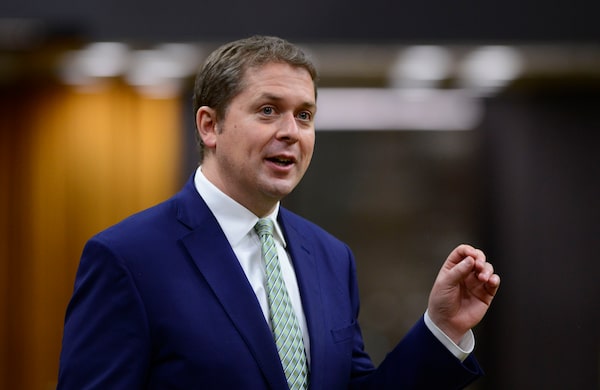
Conservative Leader Andrew Scheer, seen here on May 25, 2020, alleged during the House of Commons Question Period that Prime Minister Trudeau has adopted a 'policy of appeasement' toward China.Sean Kilpatrick/The Canadian Press
Conservative Leader Andrew Scheer is urging the Canadian government to build an international coalition and use the threat of sanctions against China’s authoritarian rulers to push back against Beijing’s efforts to tighten control over Hong Kong.
Mr. Scheer alleged during the House of Commons Question Period that Prime Minister Trudeau has adopted a “policy of appeasement” toward China, arguing that now is the time to stand up to Beijing as it moves to impose a harsh new security law on Hong Kong.
He reminded the House that former prime minister Stephen Harper played a key role in building an international coalition that imposed sanctions on Russia after its invasion and annexation of Ukraine’s Crimean peninsula in 2014.
The Prime Minister did not respond to the call for an international coalition but reiterated the need for a de-escalation of tensions.
“We have expressed in no uncertain terms our deep concern over the measures that were proposed by the Peoples’ Republic China in regard to Hong Kong,” Mr. Trudeau replied. “We stand with the people of Hong Kong who believes freedom expression, freedom of assembly an essential part of their way of life.”
The Prime Minister noted that Canada, Britain and Australia issued a firm statement on Friday, saying Beijing’s imposition of a sweeping new security law on Hong Kong “would clearly undermine” the freedoms guaranteed to the former British colony in the Sino-British treaty of 1984.
In the statement, the foreign ministers of the three countries reminded China it signed a “legally binding” declaration in the 1980s that sets out the “high degree of autonomy” Hong Kong would enjoy for 50 years after the 1997 handover of the colony.
But Mr. Scheer countered that Mr. Trudeau must “go beyond statements” and act in concert with Canada’s allies to counter China.
“This Prime Minister has let Canada get bullied and pushed around on the world stage. Two Canadians are being held illegally, the government of China put blocks on Canadian exports, all the while this government has done nothing,” Mr. Scheer said. “Why does he continue with a policy of appeasement?”
The Conservatives later pushed for a vote to convene the Commons Canada-China committee to hold hearings on Hong Kong – meeting while the House is not in session – but this motion was defeated by the Liberals and NDP.
Fen Hampson, an international affairs expert at the Norman Paterson School of International Affairs at Carleton University, said the Trudeau government’s strategy toward Hong Kong seems to be “talk softly and carry no stick.”
He said the Liberal government appears comfortable to let the United States take the lead – Washington is threatening to scrap preferential trade access for Hong Kong – while Ottawa tries to deepen relations with Beijing and free Michael Kovrig and Michael Spavor who were locked up in late 2018.
“They want the business and they want the two Michaels out of jail and that puts them in a position where they are not going to be making threats.”
He said it was far less costly for Canada to take action against Moscow in 2014 because Russia’s economy is far smaller than China’s.
“Trying to develop a business relationship with the second biggest economy in the world, China, is a very different proposition from having a relationship with a country, Russia, whose economy is smaller than our own.”
Conservative MP Garnett Genuis, a member of the Canada-China committee, accused the government of being soft on Beijing.
“Hong Kong is no less Chinese than the mainland, no less informed by China’s Confucian heritage, and yet its people love their freedom with an electrifying and inspiring passion,” he said. "It is disgraceful that we have such a mealy-mouthed response from the government on a clear-cut moral issue, which also involves a clear violation of international law.”
Our Morning Update and Evening Update newsletters are written by Globe editors, giving you a concise summary of the day’s most important headlines. Sign up today.